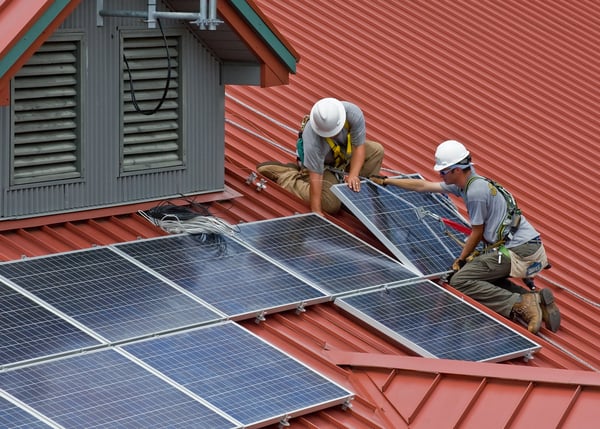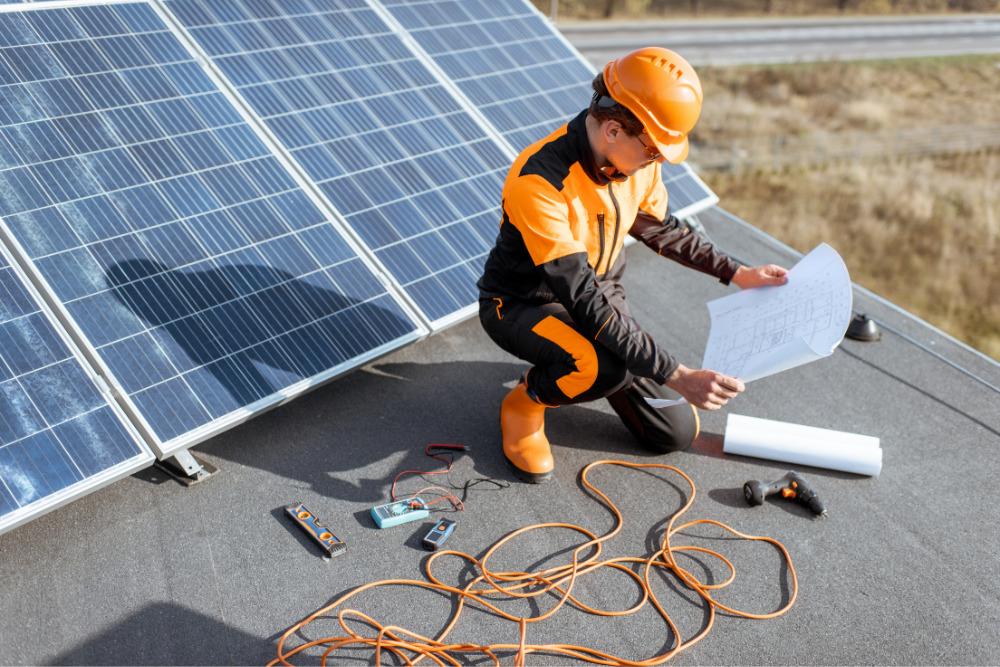The Complete Guide to Commercial Solar Power: What Businesses Need to Know in Fort Lauderdale
The Complete Guide to Commercial Solar Power: What Businesses Need to Know in Fort Lauderdale
Blog Article
Just How to Choose the Right Solar Energy Setup for Your Power Requirements
Picking an appropriate solar power installation calls for a methodical approach that starts with a clear understanding of your power intake patterns and awaited future demands. Elements such as the kind of solar innovation, setup costs, and offered motivations play critical duties in making an educated choice.
Assess Your Power Needs
Analyzing your energy requires is a vital very first action in the solar power installation process. Comprehending your existing and future energy usage will certainly assist the layout of an efficient solar system customized to your demands.
Take into consideration seasonal variants in energy consumption, as specific months might require more power because of heating or air conditioning needs. Additionally, assess any type of planned adjustments in lifestyle or residential or commercial property, such as the purchase of electric automobiles or home growths, which may raise your power needs in the future.
As soon as you have a thorough understanding of your power intake, you can establish the proper solar ability required to meet those needs. This evaluation not just aids in sizing the solar installation but additionally informs choices concerning energy storage space remedies and prospective grid link needs. solar photovoltaic. Eventually, properly gauging your power requires guarantees that your solar power system runs efficiently, supplying the advantages of renewable resource in placement with your usage patterns

Evaluate Solar Technology Options
When thinking about a solar power installment, it is important to evaluate the different solar modern technology choices readily available to make sure the system lines up with your energy demands and budget plan. The primary modern technologies include monocrystalline, polycrystalline, and thin-film solar panels, each offering distinctive advantages and downsides.
Monocrystalline panels are known for their high effectiveness and performance in restricted space, making them ideal for property setups with less roof location. However, they often tend to be a lot more costly. Polycrystalline panels, while somewhat less reliable, are normally a lot more inexpensive and can be a good selection for larger installments where area is not a restraint. Thin-film solar panels are light-weight and versatile, perfect for unique surface areas, but they typically have reduced efficiency and require more area to produce the exact same energy outcome.
In addition to panel types, think about solar inverters, which convert the straight present produced by the panels into alternating present for home usage. String inverters, microinverters, and power optimizers each have unique benefits that can impact system performance. Examining these alternatives will help you make an educated decision that meets your energy demands successfully.
Take Into Consideration Installment Prices
Understanding installation costs is important for anyone thinking about a solar energy system. These prices can differ substantially based on a number of elements, including system size, kind of panels, and installation intricacy. A regular household solar installment might range from $15,000 to $30,000 prior to rewards, which can be a considerable in advance investment.
To precisely examine installment prices, it is necessary to get comprehensive quotes from numerous solar carriers. These quotes need to damage down the expenses of equipment, labor, permits, and any type of additional accessories needed for the setup. Pay very close attention to the top quality of materials being offered, as higher-quality panels and inverters can cause much better efficiency and longevity, potentially offsetting greater initial prices.
In addition, consider the lasting ramifications of installation prices. A less expensive installation could save cash upfront yet might bring about higher upkeep costs or lowered energy production with time. It is likewise suggested to examine funding choices, such as solar financings or leases, which can impact your total financial dedication.
Research Local Incentives
Exploring neighborhood rewards can substantially influence the overall cost of a solar energy installation. Numerous regions offer a selection of economic motivations focused on advertising renewable resource use, making solar energy much more available and budget-friendly for property owners and companies alike.
These incentives may include government tax credits, state rebates, and regional energy business programs that offer cash money incentives or web metering options. The Federal Financial Investment Tax Credit Score (ITC) enables you to subtract a substantial portion of your solar setup costs from your government taxes. State-specific rewards can even more boost these financial savings, often in the type of straight cash refunds or tax obligation debts.
In addition, some regional federal governments might provide real estate tax exemptions for solar installments, ensuring that your you could try these out investment does not raise your real estate tax obligation. Looking into these motivations can uncover substantial financial savings, which can affect your choice on the dimension and sort of solar system to set up.

Pick a Credible Installer
Picking a reputable installer is vital to guaranteeing the success and longevity of click here to find out more your solar power system. The installation procedure dramatically influences the performance and performance of your solar panels, making it crucial to select a professional with a proven track document.
Following, verify the installer's credentials, including licenses, qualifications, and insurance policy. A credible installer must hold qualifications from identified companies, such as the North American Board of Licensed Energy Experts (NABCEP), suggesting a high level of expertise. Additionally, ask about the installer's experience with similar tasks, especially in your location, as local environment and laws can influence installment methods.
Demand multiple quotes and compare them not only on rate but additionally on the quality of tools and warranties supplied. A reliable installer ought to give transparent info about their product or dig this services, helping you make a notified choice. By investing time in choosing a reputable installer, you will improve the general performance and sturdiness of your solar energy system.
Verdict
Finally, choosing the appropriate solar energy installment necessitates an extensive analysis of energy requirements, an understanding of readily available solar modern technologies, and a mindful consideration of installation expenses. Checking out neighborhood incentives can enhance financial benefits, while choosing a respectable installer makes certain top quality craftsmanship and dependability. solar photovoltaic. By systematically examining these aspects, people can attain an ideal solar option that meets both current and future energy needs, inevitably adding to lasting energy practices and cost savings over time
Report this page